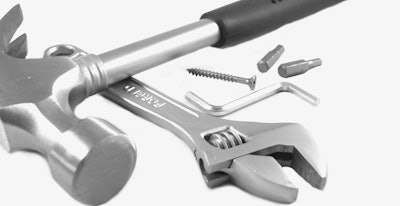
Ever try driving a car that hasn’t had an oil change, a tire rotation or its fluids checked in a year? Chances are you haven’t, and if you did, you were blinded by the check engine light the whole way to your destination. All those maintenance issues, when not properly tended to, can cause a major breakdown. Handling each tiny maintenance procedure at its scheduled time is simple and will save the driver from a serious headache.
Fortunately, cars come equipped with manuals that contain maintenance schedules and procedure instructions to help their user keep the vehicle in top condition. For those who aren’t inclined to carry out their own maintenance duties, they can simply pay a mechanic to periodically perform routine maintenance.
Ethanol plants, like any other agricultural facility, need routine maintenance as well. But ethanol plants don’t come with owner’s manuals, and there aren’t several “ethanol plant mechanics” in town who can fix all your needs in an afternoon for under a hundred bucks.
Vita Builders, a millwright services firm located in Fall River, WI, is the equivalent of a car mechanic in the ethanol plant world. Vita Builders has long been doing repairs on feed mills and grain operations, but some of its newest customers now include ethanol plants.
John Biel, sales and customer service representative, has an ample degree of knowledge and experience to offer when it comes to the upkeep of an ethanol plant. Biel shares some of his insights on how to keep key areas of the plant in optimum-running condition, from receiving to material handling to energy.
RECEIVING
It’s important to ensure that the grain receiving system runs smoothly because receiving occurs only five days a week, while productions runs 24/7.
United Wisconsin Grain Producers, LLC. (UWGP), one of Vita Builders’ regular customers, is a 50-million-gallon-a-year ethanol facility located in Friesland, WI that understands the value of an effectively run receiving area. “We’re taking in roughly 60,000 to 70,000 bushels of corn a day One of our biggest concerns is that we want to be friendly for those who come to unload,” says Dan Groh, maintenance manager at UWGP.
Some ethanol plants take in corn by rail, but UWGP receives all their shipment by truck. Being friendly to unload translates to how fast the trucks can get in, empty their loads and leave — the faster the better. UWGP has learned to make sure that the entrance is free and clear of debris and maintain enough staff to handle any unexpected issues, such as a clog in the grain unloading equipment.
The plant uses a Computerized Maintenance Management System (CMMS) called Mapcon to help it handle receiving location maintenance. The specialized program handles preventive and predictive maintenance, such as keeping records of maintenance activities and creating maintenance schedules.
But using Mapcon is only part of the equation; nothing replaces good old fashioned man power. Maintenance personnel at UWGP conduct daily walk-throughs of the receiving area to lubricate the equipment and to ensure everything is running properly.
CHOREOGRAPHING THE “DANCE”
In addition to managing the grain that comes into the plant, UWGP oversees the flow of the distiller’s dried grains with solubles (DDGS) that leaves the facility by truck or rail. The flow of traffic and grain is a carefully choreographed dance that requires monitoring and close attention to detail.
“We try to balance the amount of trucks coming and going, to avoid long wait times for drivers, but our biggest goal is to manage the grain in the elevators. We estimate how much corn is coming in and going out, and we can hold off on things to balance the grain levels. All those things have to be choreographed,” says Groh.
As far as monitoring goes, Biel emphasizes paying close attention to the hoppers and drag conveyor components, which typically are among the first parts to show wear in a new facility.
HANDLING THE GOODS
Feed mills and grain elevators are no strangers to material handling issues, but ethanol plants often run into an entirely different set of problems. Knowing the characteristics of your product can assist the maintenance aspect of material handling.
DDGS are somewhat difficult to handle. The product is wet, hot, abrasive and capable of causing serious damage to augers.
“We’ve seen the surface of the connector shafts between augers get eaten away at by the DDGS. Even when the shafts are stainless steel, problems can arise when handling the abrasive DDGS,” says Biel.
Using the proper equipment for the job can make it easier to maintain. The maintenance team at UWGP looked to Vita Builders for help when it started noticing that rubber elevator belts were defective, or so the team thought.
“The DDGS are warm and we had a problem with the rubber belt blistering from the heat,” Groh notes. “We thought it was a defective belt, but John suggested to switching to PVC belts rather than rubber.”
Monitoring systems that alert you when something is wrong are essential to proper maintenance. Electronic monitoring systems are especially useful in cases where problems can go undetected to the naked eye.
“In an ethanol plant there are a lot of invisible things like leaking valves,” Groh says. “We can’t notice an internally leaking valve until it’s too late, unless we have very good detection and use the proper calibration and instrumentation.”
ALL IN GOOD TIME
By scheduling shutdowns for maintenance, it’s easier to can identifying hidden problems. UWGP uses Vita Builders’ 10-person crew to help it effectively get through scheduled maintenance shutdowns. Experience has shown scheduling one in the spring and one in the fall is an effective approach, and up to three shutdowns per year are common.
Many customers are on this schedule, which can create some very busy months for Vita Builders.
“We’re getting into a groove of having most of our work in April and October,” Biel points out. “We’re likely to be busy those months, and we always hope that they don’t all schedule things in the same week.”
The outdoor temperature plays a big role in what maintenance can be done at what times of year. Ethanol facilities that handle large amounts of liquid may not be able to shut down during certain months, or freezing will occur.
UWGP scheduled Vita Builders to complete some upgrade maintenance projects during late fall of 2007. When the weather turned cold, it had to delay the project because of the potential for major damage caused by turning off the boilers.
Although Groh prefers to schedule a shutdown every four to five months to ensure that everything is running smoothly, that doesn’t mean UWGP does all the maintenance in one day. It’s an ongoing process that his trained maintenance personnel take seriously. “Our uptime is above 99%. In an operation like this, that’s almost unheard of,” says Groh.
The plant is able to achieve this incredibly low rate of downtime by giving each of its five maintenance staff members a different area of ownership. Groh’s staff receives specialized training in each individual’s sector of the plant and can quickly identify and address problems.
Biofuels in the News
FEW registration open
BBI International’s 24th annual Fuel Ethanol Workshop (FEW) registration is now open. Attending the FEW provides business development opportunities and educational workshops. Early bird pricing for registration expires on March 31. Go to www. fuelethanolworkshop.com.
USGC ships DDGS to Algeria
The U.S. Grains Council (USGC) successfully shipped two containers totaling 44 metric tons of distiller’s dried grains with solubles (DDGS) to Algeria.
The shipment is part of USGC’s Quality Sample Program and represent the first- ever imports of U.S. DDGS by Algeria. The DDGS will be used in feeding trials scheduled to begin in February or March.
ECI Boudiab, the largest feed grain importing company in Algeria, received the DDGS. For more than a year, the Council has been in discussions with ECI Boudiab regarding the set up of DDGS feeding trials in Algeria.
The Council projects that Algeria could easily import 100 to 200 metric tons of DDGS annually in the near future. USGC promotes co-products such as DDGS and CGF in addition to U.S. sorghum and corn in the North African region.
WIREC 2008 Gathers International Leaders
Keynote speakers for the Washington International Renewable Energy Conference (WIREC) hosted by the U.S. Government, March 4 to 6, 2008, will include international leaders throughout the field of renewable energy.
“WIREC participants will be privy to a world-class group of speakers and presenters during the three day ministerial-level meeting,” Ambassador Reno Harnish, principal deputy assistant secretary of state for oceans, environment and science, says.
Among the confirmed speakers are Minnesota Governor Tim Pawlenty, the Deputy Prime Minister of Sweden Maud Olofsson, and Lady Mayor of Bonn Baerbel Dieckmann, who serves as president of the World Mayors Council on Climate Change.
SAFEWAY USES BIODIESEL THROUGHOUT FLEET
Demonstrating biodiesel’s growing role in corporate sustainability, Safeway Inc. is fueling its entire U.S. truck fleet with cleaner-burning biodiesel. The decision was made to further the company’s Greenhouse Gas Reduction Initiative. The company will use B20, a blend of 20% biodiesel and 80% diesel, in its fleet of more than 1,000 trucks. Blends of up to 20% can be used in any diesel engine with no modification neccessary.
“Using biodiesel to power our transportation fleet will prevent millions of pounds of carbon emissions from being released into the environment. Our biodiesel program is just one of many initiatives underway that will make a positive impact on the environment,” says Chairman, President and CEO Steve Burd.
Safeway is known as a leader in corporate environmentalism and is dedicated to use solar power, alternative fuels and construction strategies in conjunction with education to reduce carbon emissions.
GENENCOR TO BUILD CENTER OF EXCELLENCE
Genencor, a biotechnology company that develops and manufactures industrial enzymes, plans to construct a 20,000-sq.-ft. Applications and Training Center in Cedar Rapids, IA.
Upon approval, construction is scheduled to be complete between the fall of 2008 and spring of 2009 at the company’s 80-acre manufacturing site.
The center will include a fully equipped laboratory for analysis and testing, and some of the industry’s top technicians and scientists. It also will provide extensive training facilities for customers and staff to build technical knowledge.

















